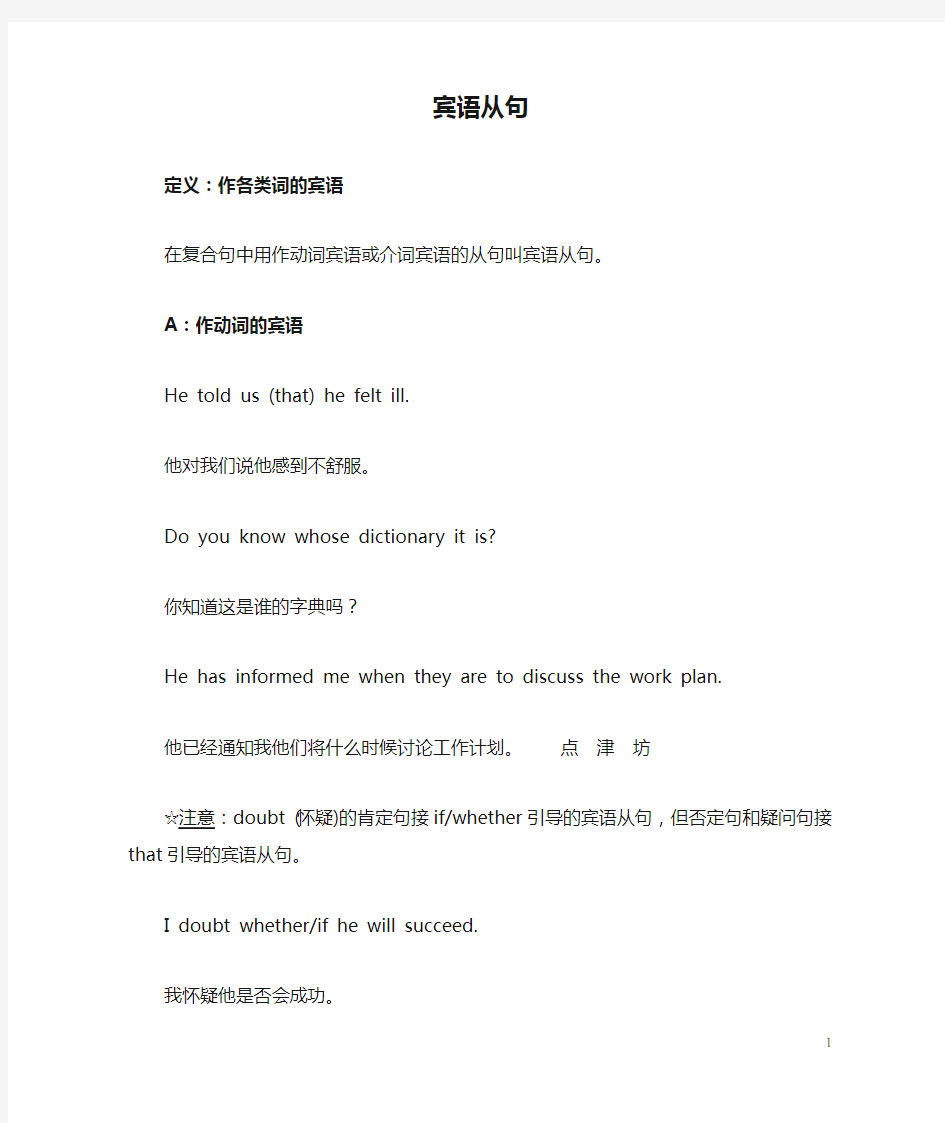英语语法之宾语从句


宾语从句
定义:作各类词的宾语
在复合句中用作动词宾语或介词宾语的从句叫宾语从句。
A:作动词的宾语
He told us (that) he felt ill.
他对我们说他感到不舒服。
Do you know whose dictionary it is?
你知道这是谁的字典吗?
He has informed me when they are to discuss the work plan.
他已经通知我他们将什么时候讨论工作计划。点津坊
☆注意:doubt (怀疑)的肯定句接if/whether引导的宾语从句,但否定句和疑问句接that引导的宾语从句。
I doubt whether/if he will succeed.
我怀疑他是否会成功。
I do not doubt that he can recite the poem.
我相信他能把这首诗背下来。
Do you doubt that he will win?
你不相信他会获胜吗?
B:作介词的宾语
He was deeply displeased by what had occurred that day.
他对那天发生的事感到很不快。
I am curious as to what he will say.
我很想知道他要说什么。
Your success will largely depend upon what you do and how you do it.
你是否成功将主要取决于你做什么和怎样做。
They were praised or criticized according to how they had done their work.
他们受表扬还是受批评是根据他们工作好坏而定的。
C:作形容词的宾语
I am not sure what I ought to do.
我不能确定我该做什么。
I'm afraid (that) you don't understand what I said.
恐怕你没领会我说的意思。
I'm surprised (that) I didn't see all that before.
我好奇怪,我以前没见过那一切。
☆注意:that引导的宾语从句只用在少数介词后,如:except, in, but等。此时,that不能省略。
I know little about him except that he lives downstairs.
我对他知之甚少,只知道他住在楼下。
He differed from his classmates in that he devoted his spare time to reading.
他和他的同学们不同的地方在于他把业余时间用在阅读上。
宾语从句其他内容
D:用it作形式宾语的情况
(1)和it作形式主语一样,我们常用it来作形式宾语,把真正的宾语从句放在句末,这种情况尤其出现在带复合宾语的句子中。
We thought it strange that Xiao Wang did not come yesterday.
我们认为小王昨天没来是奇怪的。
He has made it clear that he will not give in.
他已表明他不会屈服。
(2)由于that引导的宾语从句一般不可以直接作介词的宾语,因此当介词后面需要用that从句作宾语时,必须使用it作形式宾语。
You may depend on it that I shall always support you.
你可以放心我会永远支持你的。
I'll see to it that your problem will be dealt with immediately.
我保证你的问题会立即得到处理的。
(3)在take, hide, see to, insist on, depend on等动词以及一些表示"爱好"的动词 (enjoy, hate, like, love, don't mind, resent等) 之后,形式宾语it可直接跟宾语从句。
I take it that he's not interested in the book.
我猜想他对这本书不感兴趣。
She hid it that she was married.
她隐瞒了她已婚的事实。
(4)it不能作由连接代词whoever, whomever, whosever, whatever, whichever引导的宾语从句的形式宾语。
You may do whatever you will.
你可做任何你想做的事。
I'll take whichever book interests me.
我愿买任何让我感兴趣的书。
We are ready to offer help to whoever needs it.
我们乐意帮助任何需要帮助的人。
E:宾语从句的语序
和其他名词性从句一样,宾语从句必须使用陈述语序,不能用疑问语序。
How can I get to the station? Can you tell me?
→Can you tell me how I can get to the station?
你能告诉我怎样去车站吗?
What does he like? I wonder...
→I wonder what he likes.
我想知道他喜欢什么。
Where were you born? He asked...
→He asked me where I was born.
他问我出生的地方。
☆比较:
He asked me what was the matter.
他问我出了什么事。(the matter = wrong)
He asked me what the matter was.
他问我那是什么物质。
F:宾语从句中的时态
(1)在一般情况下,宾语从句中时态要和主句相呼应,尤其是主句为过去时态时。
He said that he had lived in Beijing since liberation.
他说自解放以来他一直住在北京。
He made it quite clear that he preferred to learn English.
他明确地说他更喜欢学英语。
(2)有时,宾语从句中时态也可以和主句不一致。
You can't imagine how they were excited when they won the first place in the game.
你无法想像他们获得比赛第一名时是多么的兴奋。
(3)客观真理和自然规律的内容在宾语从句中时态保持不变。
Mike asked whether the earth moves around the sun.
迈克问地球是否绕着太阳转。
Columbus proved that the earth is round.
哥伦布证明了地球是圆的。
G:关于that的省略
(1)一般情况下,宾语从句中的that是可以省略的。但在下列几种情况下,that一般不可省略:
介词后面的that不能省。
Peter is a good student except that he is sometimes careless.
彼得是好学生,只是有时粗心。
(2)并列连词and连接两个或两个以上宾语从句,and前面的that可以省略,and后面的that不能省略。
Everybody could see what happened and that Tom was frightened.
大家都会看出所发生的事情,并知道汤姆非常害怕。
My uncle says (that) he has served here for twenty years and that he is going to retire next month.
我叔叔说他在这儿已工作二十年了,下个月即将退休。
(3)that引导的宾语从句位于句首时,that不可省略。
That he ever said such a thing I simply don't believe.
我简直不相信他曾说过这样的话。
(4)主句谓语动词与that从句之间有插入成份,that不可省略。
He said that, if he could manage it, he would come for dinner.
他说,如果他安排得好的话,他会来吃晚饭的。
(5)宾语从句中有其他从属连词时,that不能省略。
He told me that if it was necessary they would work all night.
他告诉我,如果需要的话,他们就干个通宵。
H:宾语从句的否定转移
(1)在think, consider, believe, suppose, expect, fancy等动词后的宾语从句,如有否定意思,一般要把否定词前移到主句的谓语上,从句的谓语用肯定的形式。
I don't think he can do it better than me.
我想他不会干得比我好。
I don't believe they have finished their work yet.
我相信他们还未完成他们的工作。
I don't suppose he cares, does he?
我想他是不会在意的,是吗?
(2)在下列情况下,宾语从句不“否定转移”:
1. think等词前有副词和表示强调的do
I really expect he won't fail the examination.
我真希望他不会不通过考试。
I do think that he is not fair.
我确实认为他是不公正的。
2. think等词和其他词构成并列谓语
I think and hope that he won't cheat at cards.
我想,也希望他打牌不会作弊。
3. think等词作为插入语
His decision is not wise, I think. 我觉得他的决定并不明智。
I:含有宾语从句复合句的反意疑问句
(1)反意疑问句一般与主句一致。
He said they were going to help me, didn't he?
他说过他们要帮我,不是吗?
She told you that the mat was her own work, didn't she?
她告诉过你这个垫子是她亲自做的,是吗?
(2)当主句的主语为第一人称,谓语动词是think, believe, consider, imagine, suppose, hope等词时,反意疑问句应与宾语从句保持一致,这时特别要注意否定转移的问题。
I suppose you're serious, aren't you?
我想你是当真的,不是吗?(不可用don't I)
I don't suppose he's serious, is he?
我想他不是当真的,是吗?(不可用do I) 比较
(3)如果主语是第二、第三人称,则疑问句部分与主句一致,且不存在否定转移的问题。
You don't think we can speak English, do you?
你认为我们不会说英语,对吗?
He thinks he's got the right answer, doesn't he?
他认为自己找到了正确的答案,是吗?
J:宾语从句使用虚拟语气的情况
(1)在suggest, insist, order, demand, request, require, command, propose, desire等表示建议、命令、要求、欲望动词后面的宾语从句中,用虚拟语气,即"should + 动词原形",should常被省略。
He suggested that we (should) have a further discussion about the final decision.
他建议我们对最后的决定作进一步讨论。
She insisted that they (should) show her their passports.
她坚决要求他们向她出示护照。
(2)在wish后面的宾语从句中需要用虚拟语气,表示与事实相反或难以实现的愿望。
How I wish I had learned more!
我多么希望我以前多学一些啊!
He wishes he would have another chance to go abroad.
他希望能再有一次出国的机会。
